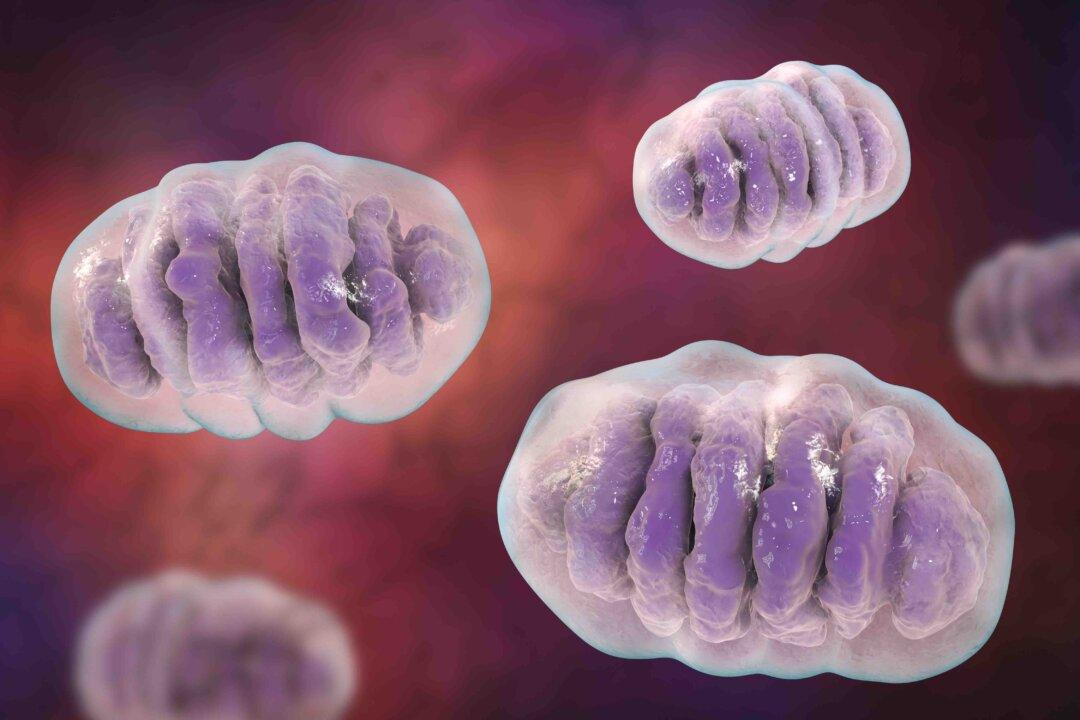Good morning, and welcome to The Epoch Times Health Brief for Sunday, Nov. 17, 2024. I’m Bill Thomas.
We have several intriguing stories to share with you right now, and here’s what’s going on.
One expert tells us that nearly all chronic diseases can be linked to how our bodies create energy, a new study links 22 very commonly-used pesticides to prostate cancer, and one reason losing weight is difficult might have less to do with calories and actually a lot more to do with hormones.
Also, that bottle of vinegar in your kitchen cabinet could be a health goldmine, and we’ll scope out a disease that can cause vertigo, hearing loss, and so much more.
Mitochondrial Imbalance Linked to 90 Percent of Chronic Diseases
New research indicates that dysfunction of our body’s mitochondria, often dubbed the “energy powerhouse of the cell,” might be at the root of about 90 percent of chronic diseases. Chen Junxu, a natural medicine expert, came to this conclusion after diving into hundreds of research papers coupled with his own extensive clinical experience.What’s really interesting is how this connects to a variety of conditions you might not expect, including everything from diabetes, allergies, and heart disease to mental health problems, arthritis, and even cancer.
To help fix mitochondrial function, Chen developed what he calls a “cocktail therapy” approach. The first major chore is switching to a low-carb diet, keeping carbs under 30 grams per day. This helps your cells change from using sugar to using ketones for energy, which can be a game-changer for your mitochondria because it reduces what’s called oxidative stress.
So you know, oxidative stress is when there’s too much damage to your cells from harmful molecules called free radicals, which can lead to neurological diseases, heart problems, and even cancer.
The next steps in Chen’s “cocktail therapy” approach include taking specific nutritional supplements, making sure you sleep enough, and practicing what he calls grounding activities; this means getting in touch with the Earth, literally, like walking barefoot on grass or on sand or swimming in natural bodies of water like lakes, rivers, and oceans.
It’s also important to point out that we need to keep our bodies in motion. Chen recommends something called “Zone 2” exercise—think casual jogging or brisk walking at a pace where you can still hold a conversation. He says this gentle approach actually helps repair your mitochondria without wearing you out and leaving you feeling exhausted.
By making some simple and basic changes—like watching what we eat, staying active, getting good rest, and avoiding environmental toxins—Chen says we can improve our mitochondrial function, and in turn, improve our overall health.
22 Pesticides Linked to Prostate Cancer
Researchers have identified nearly two dozen common pesticides that appear to be linked to higher rates of prostate cancer nationwide.The study, led by scientists at Stanford University School of Medicine in Palo Alto, California, analyzed data that included exposure to close to 300 pesticides. They also accounted for the fact that prostate cancer typically takes 10-18 years to develop after exposure to certain substances.
Among their findings was a familiar weed-killing pesticide called 2,4-D, which is found in products that many people use to keep their lawns free from dandelions, clovers, and other unwanted and unsightly plants.
Here’s where it gets even more serious: More than a dozen pesticides that were identified as possibly contributing to a higher risk of prostate cancer were not previously associated with this potentially deadly disease.
This is also highly alarming—four of the pesticides were not just linked to developing prostate cancer, but also to dying from it. These include chemicals with some complicated names like trifluralin (tri-flu-ra-lin), a common herbicide used to control grass and weeds, and thiamethoxam (thi-a-meth-ox-am), an insecticide used to kill insects that feed on roots, leaves, and other plant tissues.
This isn’t the first time pesticides have been linked to cancer. You should know that, in 2021, the National Institutes of Health said that occupational exposure to pesticides might be a “major trigger” for several types of cancer, including non-Hodgkin’s lymphoma and leukemia, as well as bladder and breast cancer.
The researchers say they are being careful about their conclusions, emphasizing that while they found certain connections, they can’t definitively say that these pesticides directly cause prostate cancer. Think of it more as a red flag that deserves closer attention rather than absolute proof.
12 Benefits of Vinegar and How to Best Use It
You might think of vinegar as something you mix with oil and pour over your salad, but this ancient ingredient, used since 5,000 B.C., is actually packed with some very impressive health benefits. From combating fatigue to helping manage blood sugar levels, it turns out a splash of vinegar can do way more than just add flavor to your food.Research published in a journal called Sports Medicine and Health Science shows that vinegar can help break down lactic acid after exercise (kind of like your sports drink does), and it might even help people with Type 2 diabetes to better manage their blood sugar levels.
Also, if you’re watching your heart health, you should know recent studies point out that regular consumption of apple cider vinegar, something like six teaspoons a day, could help lower both blood pressure and cholesterol levels.
Vinegar helps with other organ systems as well. It may stop hiccups by relieving diaphragm spasms that trigger them, and it might even help ease hangover symptoms by enhancing liver function.
But vinegar is not just working on the inside of the body, it can also be your ally in the fight against things like nail fungus because vinegar is an antimicrobial agent. Plus, it might help keep your skin looking healthy by inhibiting the production of molecules called lipid peroxides that can cause wrinkles and dark spots.
Here’s a practical tip: if you’re dealing with motion sickness or coming down with a cold, you may want to try sipping some diluted vinegar water before traveling, or gargling with a vinegar-salt solution. Some research even shows that vinegar may be good for kidney stone prevention; apparently, taking about three teaspoons a day might help keep those painful stones at bay.
However, when including vinegar in your diet and your daily routine, there are some important cautions to keep in mind. According to Traditional Chinese Medicine, too much vinegar, which is highly acidic, could possibly weaken your teeth and tendons.
If you have stomach ulcers or acid reflux, you might want to skip the vinegar altogether. As always, check with your doctor first if you decide to make any changes to your diet.
Limiting Calories Won’t Sustain Weight Loss, as Hormones Run the Show
As we all know, there’s no shortage of weight loss plans but the “calories in, calories out” approach might be missing the bigger picture, which is that hormones are actually running the show behind the scenes.Here’s the thing about calories: they come from three main sources—carbohydrates, fats, and proteins, but the body responds differently to each one. For example, refined carbs send your insulin levels soaring, while healthy fats and protein barely cause a blip.
By comparison, those veggies you’ve been eating are low in calories; they don’t turn into fat, and they help your liver clean out extra hormones while providing the nutrients your body needs to repair itself.
Hormones are like a complex orchestra that needs to work in perfect harmony. You’ve got insulin managing your blood sugar, cortisol handling stress, ghrelin making you hungry, and leptin telling you that you’re full. When these hormones get out of control (which happens more often than you might think), your body might hold onto weight regardless of how little you eat, therefore preventing weight loss.
This is where processed foods come into the picture, and here’s what you need to know. A 2019 study found that when people ate processed foods, they ended up eating more calories without even realizing it because these foods can interfere with your brain chemicals and make it very hard to stop eating, proving that it’s not just about willpower!
The solution might be to stop obsessing over calories and try focusing on hormone-friendly foods. According to nutritionists, this means getting about 30 grams of protein per meal, including healthy fats, and loading up on fiber from veggies. Also, don’t forget to drink plenty of water—aim for about half your body weight in ounces daily.
Also, many of us are always on the run and there are tons of fast food options all around us, but remember—it’s just as easy to drive by as it is to drive through.
Ménière’s Disease: Symptoms, Causes, Treatments, and Natural Approaches
Ménière’s disease is a very challenging inner ear condition that affects about 615,000 people nationwide. When fluid builds up in your inner ear, it basically throws your balance and hearing systems into chaos, leading to episodes of intense dizziness, annoying ringing in the ears, and can also lead to gradual hearing loss.The really frustrating thing about Ménière’s is that it often appears with no warning signs at all with episodes lasting anywhere from 20 minutes to 12 hours.
Some people even experience what doctors call “drop attacks”—where they suddenly fall to the ground without losing consciousness. Things like stress, fatigue, certain foods, and even changes in air pressure can sometimes trigger episodes.
While doctors aren’t 100 percent sure what causes it, they’ve noticed some patterns. Ménière’s tends to show up most often in people between 40 and 60 years old, especially those of European descent. Also, here’s a surprising detail—smoking can actually make it worse because it interferes with blood flow to the nerves in your inner ear that regulate equilibrium and balance.
Unfortunately, there’s no cure, but there are quite a few ways to manage it. The first line of defense is usually lifestyle changes, including cutting back on salt (which affects fluid pressure in your ears), avoiding caffeine and alcohol, and staying well-hydrated.
Some natural approaches have shown promise as well, with some patients finding relief through participating in tai chi and acupuncture, though more research is needed to confirm these benefits.
One key to managing Ménière’s is first catching it early and then maintaining a positive mindset, which doctors say can make a substantial difference.
And now, it looks like our time is just about up for today, so we’re gonna call it a wrap for this edition of The Epoch Times Health Brief.
And don’t forget the Health Brief Motto: We’re portable, affordable, and always on-demand.
And finally, as we do each and every week on this program, we share with you a very notable quote, and this one comes to us from Jim Rohn, who said:
“Take care of your body. It’s the only place you have to live.”
Rohn was a motivational and personal development speaker and an entrepreneur.
We wrap everything up with our health tip of the day: Laugh more, stress less. Watch cartoons or a comedy show—laughter reduces stress hormones and can also boost immunity.
For all of us here at The Epoch Times Health Brief, I’m Bill Thomas.
The Epoch Times Health Brief program was written today by Hristina Byrnes.
Thank you for making us your one-stop source for a concise, accurate, and unbiased weekly synopsis of many of the health stories you need to know about.
Enjoy the remainder of your day and we'll see you right back here next time for another edition of The Epoch Times Health Brief.
For now, let’s all continue to watch out for one another and have an absolutely superb day today. Bye for now.





